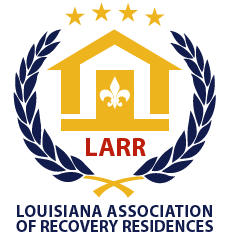What is a sober living home?
A Sober Living Home in its truest form is simply a housing component, separate from clinical services, that offers those recovering from drugs and alcohol addiction a safe, clean, conducive environment to encourage their sobriety. Many Sober Living Homes and Halfway Houses provide auxiliary services that differentiate themselves from others. These services, many times affect the cost. The key services that a Sober Living Home provides, however, are: Accountability, Community and Safety.
There are different “levels” of accountability that Sober Living Homes offer. Some are peer-run agencies that run on the simple premise that others in home will keep you accountable. Others go so far as to have 24/7 staff with high structure and discipline. The home you choose should reflect the existing conditions of you or your loved one.
What to look for in a sober living home
LARR Certification
All LARR certified homes are required to show the LARR certification seal on the website and printed materials and must remove it if certification is revoked. If a sober living home bears ours seal it means that it has recently gone through an inspection. That inspection reviews the house for cleanliness, rules, regulations, proper safety concerns such as , fire extinguishers and smoke alarms as well as operating under policies and procedures conducive to the LARR ethics and standards.
- Safe, Sober Environment:
- Drug Testing and “Breathalyzers” Administered On-Site
- Discharge Protocol if a Client in the House were to Relapse
- Clean Time or Experience of Staff
- Mandatory Outside Support Group Meetings
- House Rules are Enforced
- Medication Policy
- Community Reputation
- Services and Cost
- What Auxiliary Services does the Sober Living Home Offer
- Transportation?
- Meal Preparation?
- In-House Meetings?
- Employment Assistance?
- How much can the client afford on their own?
- Refund Policy
- No Sober Living Home should accept insurance as form of payment
- What Auxiliary Services does the Sober Living Home Offer
- Structure and Accountability
- 24/7 Available Support
- On-Site Managers
- Curfew
- Overnight passes
- Guest Policy
- Is there a Minimum Length of time Commitment
- Neighborhood
- Is Sober Living Home Close to your place of employment or potential employment?
- Is the neighborhood safe?
- Close to Public Transportation?
- Is the it close to recreation that clients can have “sober fun?”
Are the support staff members of a recovery community?
LARR recognizes that affordable level 1 & 2 homes typically do not have the means for 24 hour staffing and are not required to do so. Level 3-4 homes are required to have 24 hour staff or volunteers on site.
Who is in charge?
Recovery homes are to be run democratically but that doesn’t mean that there cant be a senior member or staff oversight with some experience. It is important to know who is making the decisions. Can a person be kicked out of the home because other residents don’t like they way they chew gum? Seems silly, but often this actually happens. You want to make sure that the home has staff or a manager / president who care for the residents appropriately.
What is the relapse policy?
It is important to know exactly what the relapse policy is
Do you allow narcotic prescriptions at all? If so, how is that monitored?
Is the home or does the home allow Medically Assisted Treatment (MAT)
MAT housing is one of the newer ideologies in the sober living industry and there are some who say can work. Although a very controversial topic, what most professionals (if not all) will agree on is that you should NEVER mix a abstinent population with a population that is actively using prescription narcotics.
What happens if I (or my loved one) stops going to or switches Intensive Outpatient Programs (IOP)?
Make sure to ask the sober home if they require that they attend THAT TREATMENT CENTERS IOP. It is well documented that a clinical aftercare program (IOP) is beneficial to a newly sober addict or alcoholic. Especially in combination with a quality sober home. But it is also well documented that there is no one path to recovery and that different approaches work for different people. Meaning that no single curriculum, group, approach, counselor or combination of will work for everyone. Many times the sober living home has a deal worked out with the treatment centers where they will get the referral from the treatment center (i.e. money) as long as the sober house mandates that the resident go to that treatment centers IOP program (i.e. money).
This situation is unfortunately very common in Louisiana and motivated by money for the treatment center not the patients care. A patient will usually agree to go to the centers IOP program. But weeks after attending they see that the program is not what they were told it was and/or they receive no value from it. Now, the resident of the home has to make a decision. Do they waste 3 hrs a day- 3 days a week in a program they know they are not getting anything out of, or do they leave the IOP program and subsequently loose their housing? We have seen a commonality in how well a person does be directly affected by this pressure.

